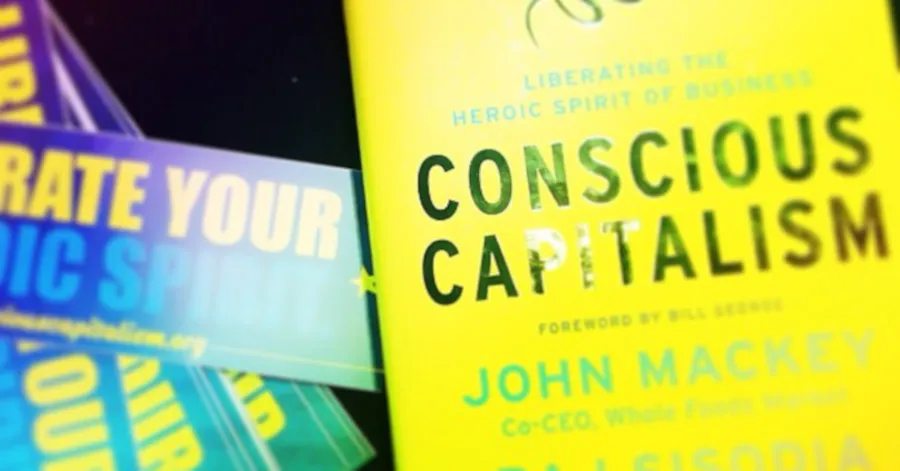The term conscious capitalism refers to a socially responsible economic and political philosophy. That's literally the description given by Investopedia, the Wikipedia for entrepreneurs and investors. Now, why am I so amused and simultaneously so saddened by this obvious marketing-ploy? Read on to find out...

Image by BeckyCortino - source: Flickr
Well, the answer is fairly simple, and one that I believe most of you have already figured out for yourselves; "conscious capitalism" is a contradiction in terms. We've seen what capitalism does. The whole world is capitalist, as we have a capitalist world-economy, and when we ask if capitalism "works", only 25 percent of the world's population enjoys a standard of living that could tempt them into answering that question in the affirmative. Most of us have to work hard all our lifes with nothing to show for it at the end. And we're the lucky ones! Granted, I say this without reckoning with the opportunity given to all of us by the cryptocurrency- and blockchain technology revolution we all have the good fortune to participate in, which has in it the potential to temporarily upset the status quo. Note the use of the word "temporarily" though; bitcoin only solves the problem of banks and money, it in itself does nothing to change capitalism's built-in power imbalance. It merely creates the opportunity for us common folks to invest in an asset before the infamous 1 percent does. And even that is coming to an end...
Let's see what more Investopedia has to say about "conscious capitalism" to make clear why it is a contradiction in terms as well as a common marketing-ploy:
The concept of conscious capitalism was coined and popularized by John Mackey, Whole Foods co-founder, and co-CEO, and Raj Sisodia, professor of marketing at Bentley University, in their book "Conscious Capitalism: Liberating the Heroic Spirit of Business." The two are also co-founders of Conscious Capitalism, a nonprofit organization that has chapters in more than two dozen U.S. cities and ten other countries.
The conscious capitalism credo acknowledges that while free-market capitalism is the most powerful system for social cooperation and human progress, people can aspire to achieve more. It does not minimize profit-seeking but encourages the assimilation of all common interests into the company's business plan.
Building on the foundation of traditional capitalism—which includes competition, entrepreneurship, freedom to trade, the rule of law, and voluntary exchange—the credo adds elements like trust, compassion, collaboration, and value creation to the formula. Although profits don't take a backseat in conscious capitalism, the philosophy emphasizes doing so in a manner that integrates the interests of all major stakeholders in a company.
source: Investopedia
So, right away we see that the term was co-coined (just made that up) by a professor of marketing; modern consumers want to buy products that are produced responsibly and ethically. They want packaging of their products to be bio-degradable and the products to be made of recycled resources. And most importantly, they're willing to pay a premium if they believe the manufacturers comply with those demands. Now, before you go on and say "that's perfect, it shows how free markets result in favorable outcomes", hear me out. "Profits don't take a backseat in conscious capitalism"; that's where the whole idea is broken, that's why it will never work, and that's where the idea originated in the first place. Conscious capitalism is marketing, and marketing only. As long as there's no less emphasis on making profits, there's no "serving all stakeholders involved including their employees, humanity, and the environment". I hope I don't have to explain why that is. Let me just say this: in capitalism the worker and the owner have opposing goals, as the worker wants to work as little as possible for as high a pay as possible, while the owner wants workers to work as much as possible for as little pay they can get away with. And as competition necessitates the maximization of profits, well, something similar goes for humanity and the environment.
And when we think of a socioeconomic arrangement that does serve all involved stakeholders, we eventually arrive at a system in which the means of production are not in private hands, but in the hands of the workers; we arrive at socialism, where each worker has a vote in every company decision. Workers won't allow the factory to poison the river or lake their children swim in, they won't move the factory to a low wage country, they won't pay management hundreds of times more than regular workers, they won't put lead in the toys their children play with, because the workers are also the customers who live in the vicinity of their workplace. Conscious capitalism is'n capitalism at all, it's socialism. The video will go into more detail about the whole conscious capitalism hoax; I hope you'll enjoy it!
The Predictable Rise of Conscious Capitalism
Thanks so much for visiting my blog and reading my posts dear reader, I appreciate that a lot :-) If you like my content, please consider leaving a comment, upvote or resteem. I'll be back here tomorrow and sincerely hope you'll join me. Until then, keep safe, keep healthy!

Recent articles you might be interested in:
| Latest article >>>>>>>>>>> | Ministry Of Truth (repost) |
|---|---|
| Neo-Liberalism | Want Freedom? |
| Shut Up And Smile! | Welcome To The Marketplace Of Everything! |
| Are We Just Consumers? | Speech Power Dynamics |

Thanks for stopping by and reading. If you really liked this content, if you disagree (or if you do agree), please leave a comment. Of course, upvotes, follows, resteems are all greatly appreciated, but nothing brings me and you more growth than sharing our ideas.
